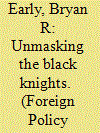| Srl | Item |
| 1 |
ID:
179204


|
|
|
|
|
| Summary/Abstract |
Do authoritarian regimes engage in active export of their political systems? Or are they primarily concerned about their geopolitical interests? This article explores these questions by examining Russia’s policy towards Abkhazia, South Ossetia, and Transnistria. In all three de facto states, Moscow is fully able to dictate election outcomes should it desire to, but, we argue, has increasingly refrained from doing so. These client states are unlikely to attempt to escape from Russia’s tutelage; and with its geopolitical interests fully ensured, Russia appears willing to grant them latitude. We then ask whether these findings can be extrapolated to serve as a template for understanding Russia’s policy towards its client states more generally, discussing Moscow’s reactions to attempted regime change in Armenia and Belarus.
|
|
|
|
|
|
|
|
|
|
|
|
|
|
|
|
| 2 |
ID:
108185


|
|
|
|
|
| Publication |
2011.
|
| Summary/Abstract |
Despite clear expectations that sanctions busters undermine the effectiveness of economic sanctions, most empirical studies of the phenomenon fail to find that they significantly affect sanctions outcomes. One explanation for these puzzling results is that past studies have almost all relied on Hufbauer, Schott, and Elliott's (1990) dichotomous, time-invariant "black knight" variable to operationalize the occurrence of sanctions-busting. This piece develops a more nuanced account of how the timing, quantity, and nature of sanctions-busting trade affects sanctions' outcomes and codes a new set of sanctions-busting variables that capture these distinctions. Two competing accounts of sanctions-busting are tested in the analysis, one that asserts that only politically motivated sanctions busters (i.e., black knights) negatively affect sanctions' success and one that asserts that commercially and politically motivated sanctions busters jointly undermine their success. These rival accounts are tested using a competing risks analysis of 96 episodes of US-imposed sanctions from 1950 to 2006. The results indicate that while black knights alone do not make sanctions more likely to fail, in conjunction with commercially-motivated sanctions busters they do exercise a potent, negative effect on sanctions' success. These findings have important implications for how third party responses affect sanctions outcomes.
|
|
|
|
|
|
|
|
|
|
|
|
|
|
|
|